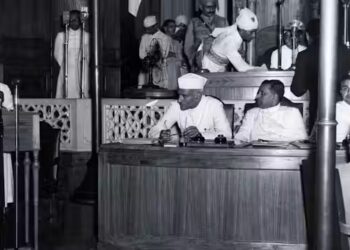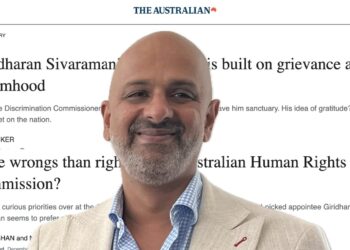The recent bipartisan commitment to establish a Hindu school in Western Sydney, with funding pledged by both Prime Minister Anthony Albanese and Opposition Leader Peter Dutton, raises critical questions about the role of religious institutions in our publicly funded education system. While acknowledging the cultural and spiritual significance of such initiatives, it’s imperative to scrutinise the broader implications of government funding for religious schools. Continuing to allocate public funds to religious schools is a practice that warrants cessation.
Education for the 21st Century
The landscape of Australian society has evolved dramatically over the past century. Our classrooms are now microcosms of a diverse, multicultural nation, reflecting a wide array of beliefs and worldviews. The educational paradigms of yesteryears, which accommodated religious instruction within public schooling, no longer align with the contemporary ethos of inclusivity and secularism. Today’s students require an education that prepares them for a pluralistic society, fostering critical thinking and mutual respect among differing perspectives. The notion that religious schools are necessary for faith-based education is outdated; in a secular nation, religious instruction should be the responsibility of families and faith institutions, not the government.
Moreover, one or two religious schools for a widely dispersed community in a constantly expanding metropolis will only serve a handful. The majority of Hindu children will still attend secular schools, making it even more critical that education about religion remains inclusive and broadly accessible.
The Victorian Model: A Blueprint for Secular Education
Victoria’s approach to religious education offers a compelling model. The state’s curriculum integrates the study of various religions, atheism, and humanism across multiple subjects, aiming to cultivate understanding without promoting any specific doctrine. This method, known as “Learning About World Views and Religions,” is designed to help students comprehend the key tenets of major world religions and non-religious perspectives. Qualified educators deliver this content within frameworks such as Civics and Citizenship and Ethical Capability, ensuring an impartial and informed exploration of diverse beliefs. The shift away from faith-based instruction within school hours, implemented in 2015, ensures that education remains secular while equipping students with a broad understanding of world views.
Lessons from Fremont: Guarding Against Sectarian Agendas
Internationally, the recent developments in Fremont, California, serve as a cautionary tale. Secular organisations successfully thwarted attempts by Hindu nationalist groups to alter school curricula to exclude discussions on caste oppression. The attempt to rewrite history to suit a sectarian agenda was rejected because education must be about truth, not religious or political ideology. Similarly, there are concerns that a Hindu school in Australia could fall prey to historical revisionism, with curricula manipulated to reflect a narrow, exclusionary interpretation of Hinduism. The precedent set in Fremont underscores the need for vigilance in ensuring that government-funded religious schools do not become vehicles for sectarian or nationalistic ideologies.
Concerns Over Hindutva Influence and Curriculum Manipulation
The media release from Hindus for Human Rights Australia and New Zealand (HfHR-ANZ) highlights serious concerns about the ideological affiliations of groups backing the proposed Hindu school. There are fears that the curriculum may be influenced by Hindutva—Hindu nationalism—which has been associated with sectarian violence and historical revisionism in India. Reports from The Guardian have detailed how textbooks under the current Indian regime have been altered to downplay caste oppression and erase inconvenient historical facts. If this school is to receive government funding, robust oversight mechanisms must be in place to ensure that it does not become a breeding ground for such ideologies.
Tokenism vs. Real Action for Indian Migrants
Indian migrants should not allow themselves to be placated by symbolic gestures such as a Hindu school while real issues affecting their community remain unaddressed. The challenges faced by Indian Australians—including cost-of-living pressures, access to free education and healthcare, genuine political representation, and combating racism—require urgent attention. If governments are serious about supporting the Indian community, they should prioritise policies that provide tangible benefits rather than indulging in tokenistic identity politics.
Secular Oversight for a More Inclusive Approach
Since the establishment of this school appears inevitable, it is crucial to ensure that it is genuinely inclusive and not an instrument for exclusionary agendas. The curriculum must be formulated with input from secular and rational diaspora groups such as Hindus for Human Rights, The Humanism Project, and the Rationalist Society of Australia. Additionally, representatives from caste-oppressed communities, such as the Ambedkar International Mission and Periyar Ambedkar Thought Circle Australia must be included in the consultation process to ensure that historical injustices are acknowledged and addressed in the educational material.
The Path Forward: A Secular, Unified Education System
The broader issue remains: why should Australian taxpayers fund religious schools at all? In a nation that prides itself on its secular values, government resources should be directed towards strengthening public education rather than financing institutions that segregate children based on faith. The Victorian model demonstrates that a secular education system can provide students with a comprehensive understanding of religion without entrenching sectarian divisions.
Ultimately, the way forward is clear—government funding for religious schools should be phased out, and education about religion should be embedded in a secular curriculum. If public funds are to be spent on education, they should support an inclusive, equitable system that serves all Australians, regardless of their faith or background. The future of education in Australia should be one that unites rather than divides.
Postscript: Addressing Community Concerns
The proposal for a Hindu school has ignited strong reactions, with some Australians viewing it as sectarian and incompatible with the nation’s long-standing approach to multiculturalism. As highlighted in Hindus for Human Rights’ media release, a segment of online discourse includes racist rhetoric, misconceptions about Australia’s identity as a “Christian nation,” and fears of an “Indian takeover.”

However, dismissing all concerns as mere bigotry risks alienating a broader section of mainstream Australians, whose anxieties about social cohesion should not be ignored. The success of multiculturalism depends on inclusive dialogue, not cultural silos. If these concerns are left unaddressed, they risk being exploited by right-wing politicians who thrive on division. A genuinely inclusive consultation must engage all communities—including Anglo-Australians—ensuring that multiculturalism strengthens, rather than fractures, the social fabric.
(A campaign has been launched calling for an inclusive and transparent consultation process in the establishment of the proposed Hindu school in Western Sydney. The initiative, backed by secular, rationalist, and anti-caste advocacy groups, urges the government to ensure that the school’s curriculum reflects the diverse perspectives within the Hindu and South Asian communities. The campaign highlights concerns over sectarian influences and calls for input from organisations committed to human rights, secularism, and caste equity. Supporters can sign the petition at Support Inclusive Education.)











